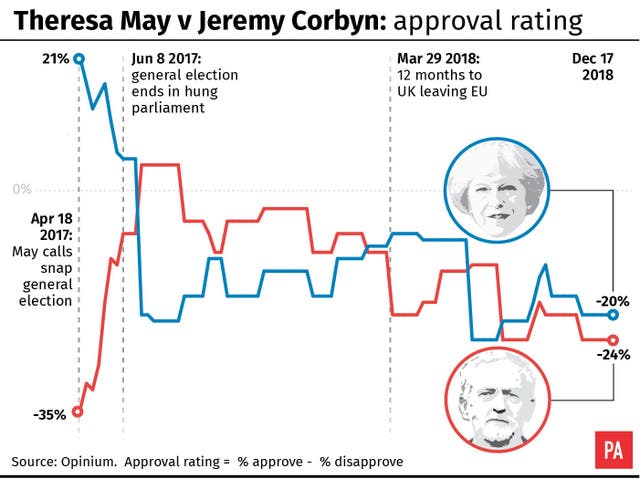What is happening with Labour’s no-confidence motion in Theresa May?
Leader Jeremy Corbyn is seeking to challenge the Prime Minister’s authority over Brexit.

Labour sought to pile the pressure on Theresa May as Prime Minister following delays to the Brexit deal vote, but the PM hit back as she effectively dared Jeremy Corbyn to try to bring down her Government.
Here we answer the key questions over what it all means.
– What did Jeremy Corbyn table?
The Labour leader put forward a no-confidence motion in Mrs May as PM, bemoaning the “unacceptable” wait for a Commons vote on her Brexit deal. Mrs May has scheduled the vote for the week beginning January 14 after initially cancelling a December 11 vote due to impending defeat.
Labour hopes it will show Mrs May has lost the confidence of the Commons and potentially remove her as leader, but it is not expected to automatically trigger a general election.
– How can that be done?
A motion of no confidence in the Government as a whole, rather than an individual, tabled under the Fixed-term Parliaments Act (FTPA) would create the potential for a general election.
– How did Downing Street respond to the motion?
No 10 accused the Labour leader of a political “stunt”, and said the Government would not allow parliamentary time for a vote.
A Downing Street source challenged Labour to strengthen its attack.
They said: “We won’t allow time for what is a stunt.
“The FTPA applies if Labour wants to put down a motion under the terms of that.”
Labour said it was clearly a confidence motion and should be allocated time for debate by the Government.
The House of Commons authorities said it was for the Government to determine whether to schedule time for a debate.

Tory Brexiteers have said they would vote against the motion, boosting Mrs May’s chances.
– What do other opposition parties think of the motion?
The smaller opposition parties have tabled an amendment to Mr Corbyn’s no-confidence vote in Mrs May that they say would beef it up into a full confidence vote in the Government.
The SNP, Liberal Democrats, Plaid Cymru and the Green Party have backed the change, laid down on Monday night to trigger the legally binding FTPA provisions.





